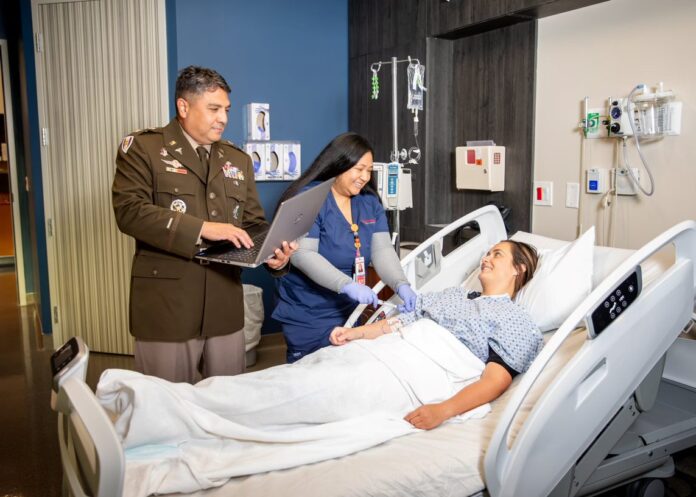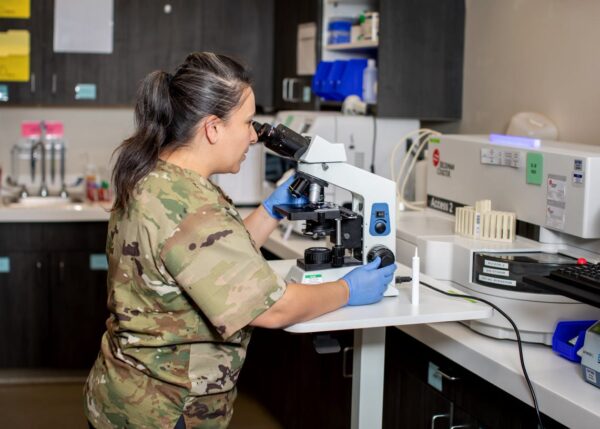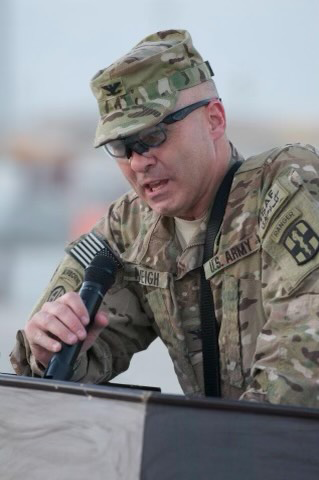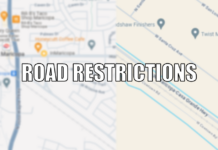
For Bruce McVeigh, a 30-year Army veteran and the chief operating officer at Exceptional Community Hospital, a defining moment came at 9:37 a.m. on Sept. 11, 2001, when American Airlines Flight 77 slammed into the Pentagon’s west side, killing 184 and injuring 160.
McVeigh was serving as the chief of current medical operations for Secretary James Peake, who at the time was the Army’s surgeon general.
Both worked in the basement of the Pentagon, one of the targets of the 9/11 terrorist attacks that day that also claimed the World Trade Center towers and 2,763 lives there, along with another 44 victims in the hijacking and subsequent crash of United Airlines Flight 93 in southwestern Pennsylvania.
In the wake of 9/11, the mission was clear: care for the injured.
“I remember going with Secretary Peake, late at night, the wee hours of the morning, visiting every single person in the Army who got injured in that attack on the Pentagon,” McVeigh said.
It was a process that spanned many nights and hospitals all over the Washington, D.C., metro area.
“It was all for the patient,” McVeigh said.
McVeigh said it’s a notion that remains with him to this day in his role at Maricopa’s lone hospital.
“It’s not about us,” McVeigh said. “It’s about the patients we serve in each community where we operate. We want to provide the best care to them and to be good partners in those communities, regardless of whether it’s Maricopa, Yuma or Bullhead City.”
That same dedication to community inspires Barbara Dudik Huerta, the hospital’s laboratory manager and technical consultant.
“I’m proud that we now have a hospital in the city of Maricopa to not only take care of a community that’s been underserved, but I live here,” said Huerta. “My kids live here. My husband is here. My parents live in Maricopa, along with two of my brothers. It’s nice to not only serve the community but my family.”

Any other office in the city must send lab work out to a contractor like LabCorp or SunQuest, which can’t deliver same-day results, Huerta said. About 90% of all health care decisions are made according to lab results.
“At Exceptional Community Hospital, we’re going to have those results the same day and doctors will be able to make decisions in a timely manner,” Huerta said.
Huerta is a veteran, too. She served more than four years in the Army as a lab tech at the San Antonio Military Medical Center, a 1.5 million-square-foot facility that includes a state-of-the art burn unit. It’s the home of the U.S. Army Institute of Surgical Research Burn Center.
“It is the only Level 1 trauma center in the Department of Defense,” Huerta said. “We were a hospital that got a lot of massively injured soldiers from downrange [Afghanistan and Iraq] that were coming to heal and get better. A lot of them were from burns.”
Personal care
Carmela Hamlett, a registered nurse at Exceptional Community Hospital, spent 14 years in the Army as a combat medic. Her title eventually morphed to health care specialist, but the job remained the same.
While the focus most of the time is on physical ailments, Hamlett also saw to the soldiers’ mental and emotional well-being.
As part of one assignment, Hamlett was tasked with helping soldiers medically discharged from Afghanistan transition back into the civilian world.
“Many were amputees, and others suffered traumatic brain injuries,” Hamlett said.
Her job sometimes meant assisting families as they helped care for soldiers when they got home, getting them ready to attend school and prepare for the rest of their lives.
“It’s definitely something different, especially for combat veterans,” Hamlett said. “They have a hard time grasping the concept of being a civilian. The camaraderie they’re used to as soldiers is gone once they become civilians and they’re left wondering, ‘What do I do now?’”
Early in her Army career, Hamlett was stationed in Kuwait and had plans to be deployed to Iraq and Afghanistan.
“But it never happened,” she said. “There were always extenuating situations where I was ordered not to get on that plane. I just took it as a sign that if I went, bad things would have happened.”
Instead, Hamlett drew other interesting assignments during her military career. The first was serving as health care support personnel for the Yuma-based Free Fall School. She also supported the Army’s parachute team that jumped in Arizona during the winters.
Hamlett faced her fear of heights head-on when she jumped with the Golden Knights, an elite group of Army skydivers.
She later served as medical support for the World Class Athlete Program, where she was onsite while members of the military trained for the Olympics.
“You never really hear people talk about it but there are so many cool jobs in the Army,” Hamlett said.
Filling a need
When it comes to opening a hospital, the devil is in the details. From personnel to supply chains, there’s a dizzying list of demands to get a hospital up and running.
To find people capable of handling such a gargantuan task, the Armed Forces are a good place to look.

“Sometimes it was a combat zone or for humanitarian relief or disaster assistance,” Cardenas said.
Cardenas was stationed in Fort Liberty (N.C.) from 2007 to 2010. From there, he was deployed to Iraq, where he worked to support medical systems for the troops in Baghdad. In 2010, he was deployed to Haiti after the worst earthquake there since the 1800s. The initial quake was a magnitude 7, followed by aftershocks of 5.9 and 5.5.
“It was a massive humanitarian effort,” Cardenas said. “I was one of about the first 60 people from the U.S. Army on the ground. They needed a medical planner and an operations specialist and that was my field.”
He spent three months in Haiti, a nation with little infrastructure prior to the earthquake.
“Our focus was to provide care for the troops who were on the ground,” Cardenas said. “A lot of what we did was repair buildings, and sometimes, those included hospitals.”
A year later, Cardenas found himself on a plane to Japan. This time, it was following the tsunami that struck that country in 2011, devastating its infrastructure and damaging the nuclear reactor at Fukushima.
“They needed someone with my skill set again,” Cardenas said. “My wife was starting to wonder — I had to promise her I wasn’t chasing natural disasters all over the world.”
While Arizona isn’t the site of a natural disaster or a war zone, it’s a fast-growing state where people arrive in new locations before health care systems can be created, meaning that in many cases, companies like Exceptional Healthcare and specialists like Cardenas are building systems from scratch.
Exceptional Healthcare is expanding its footprint in Arizona. It opened a hospital in Yuma a few months after the Maricopa facility debuted. It will also open a hospital in Bullhead City this month and another early next year in Prescott.
While Cardenas no longer needs to worry about deployment to other countries, he spends a lot of time all over Arizona doing the same work he’s always done.
“It’s back to doing what I’ve been doing my whole life, which was supporting clinical experts and clinicians of all types of positions and nurses,” he said. “My job in the Army for almost 30 years was to make sure that the medical providers were in the right place at the right time to do the most good for the most people, regardless of if that meant on a battlefield or if it meant in Haiti, Japan or whatever installation in the U.S. or across the world.”
Mission accomplished
Regardless of the field, any operation is only as good as its people. Exceptional Healthcare aims to hire the best people regardless of background, but McVeigh explained there’s an advantage to hiring veterans.
“What military people bring is a work ethic that, honestly, a lot of folks can’t replicate,” McVeigh said. “We go until the mission’s done.”
A good example was when Hamlett retired from the Army. She’d finished up her prerequisites at Mesa Community College but found herself on the waiting list for an associate’s degree program.
“It was taking too long,” Hamlett said. “So, I looked into using my GI bill to go to a private college and I ended up going to Chamberlain University in Phoenix, which has an accelerated bachelor’s degree program.”
That tenacity is what McVeigh likes about veterans, he said.
“They don’t stop,” McVeigh said. “They can look at things in a different way and can multitask.
“We think in a different way to achieve an end state. We don’t stop until the mission has reached its end state.”
Competition for veterans can be fierce. When Cardenas was hired earlier this year, there was a courtship.
“We wooed him for a couple of months before we were able to get him on board,” McVeigh said.
When Cardenas was plotting his next move, he also considered a serious offer from an aerospace firm in Huntsville, Ala.
McVeigh said he feels there must be an underlying mission behind any career.
“It’s amazing how people hit you up either on LinkedIn or whatever, trying to steal you away to work somewhere else because they get it, they want it,” he said.
“But I believe in Exceptional, and I believe in the mission and the long-term vision. As quick as I get those inquiries, I send them away and say, ‘No, I’m good. I’m where I need to stay.’”
The November edition of InMaricopa Magazine is in Maricopa mailboxes and available online.




![City gave new manager big low-interest home loan City Manager Ben Bitter speaks during a Chamber of Commerce event at Global Water Resources on April 11, 2024. Bitter discussed the current state of economic development in Maricopa, as well as hinting at lowering property tax rates again. [Monica D. Spencer]](https://www.inmaricopa.com/wp-content/uploads/2024/04/spencer-041124-ben-bitter-chamber-property-taxes-web-218x150.jpg)

![3 things to know about the new city budget Vice Mayor Amber Liermann and Councilmember Eric Goettl review parts of the city's 2024 operational budget with Mayor Nancy Smith on April 24, 2024. [Monica D. Spencer]](https://www.inmaricopa.com/wp-content/uploads/2024/04/spencer-042424-preliminary-budget-meeting-web-218x150.jpg)





![Alleged car thief released without charges Phoenix police stop a stolen vehicle on April 20, 2024. [Facebook]](https://www.inmaricopa.com/wp-content/uploads/2024/04/IMG_5040-218x150.jpg)




